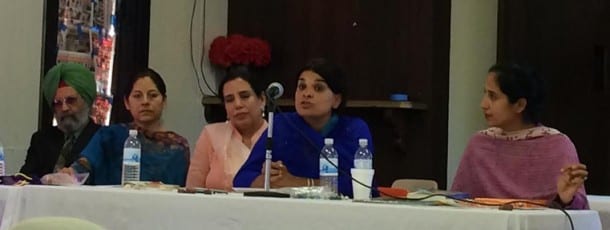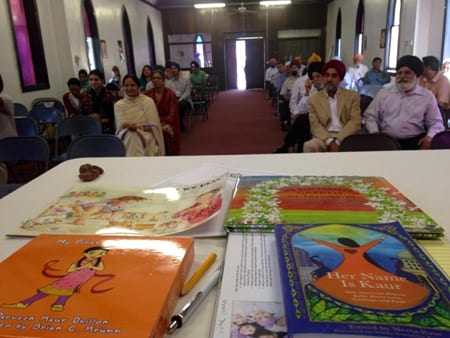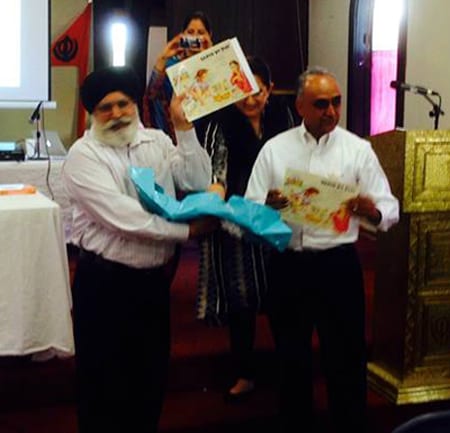HAYWARD, California, USA—On September 6, 2014, the Sikh Foundation presented Sikh Authors Speak, a panel discussion and celebration, in Hayward, California. Four writers—Parveen Kaur Dhillon, Meeta Kaur, Jessi Kaur, and Pushpinder Kaur—spoke about their published works, their sources of inspiration, and their future plans. Sardool Singh Samra and Dr. Gurinder Pal Singh launched a new book, Games We Play, a project they supported from its inception. Finally, Guneeta Singh Bhalla and Pashaura Singh Dhillon presented their work in oral history and folk music, respectively. Themes that emerged from the afternoon’s presentations included the importance of women’s leadership and the ongoing need to promote Sikh identity and values, especially among children in the diaspora and in particular through books and reading.
After a rousing shabad by Gurpreet Kaur and Sisters, Parveen Kaur Dhillon kicked off the proceedings. She discussed the genesis of her two-volume set, My First Sikh Books. Dhillon grew up in the US without the benefit of books that reflected her own identity. When she and her husband started their own family, she was inspired to create My First Singh Book and My First Kaur Book so that that her own children could begin cultivating positive self-image through books right away.
Dhillon made the first prototypes of her books on her own, exclusively for her family, in order to instill in her children a sense of pride in both their visual identity and in their practice of Sikh values. People started borrowing the books, so eventually she and her husband had them published.
Today, this two-book set gives young Sikh children a chance to see characters who look like them. The books also cover three basic core concepts of Sikhi. The two books are sold as a package so that one gender is not privileged over another. Just as in life, Singhs and Kaurs and their contributions are equally important. Dhillon’s next project is a book about 1984.
Next, Meeta Kaur introduced her edited volume, Her Name is Kaur: Sikh American Women Write about Love, Courage, and Faith, which brings together 25 stories by different writers, who talk about the many different types of love they experience. Kaur wanted to read a book in which she could hear the voices of the women she grew up with in the Central Valley of California, and she was inspired by the advice of Toni Morrison: “If there’s a book that you want to read, but it hasn’t been written yet, then you must write it.”
Kaur talked about how her book project turned out to be about more than just women sharing stories. In working with writers, Kaur aimed to break down stereotypes about how women relate to one another, to dissolve hierarchies, and to build trust. She is currently working a collection of men’s stories with a similar set of objectives beyond the literary: to give men the emotional space to think about the role of love in their own stories in order to bolster their spiritual lives.
Jessi Kaur spoke about the inspiration for her imaginative, illustrated take on a Janamsakhi, The Enchanted Garden of Talwandi: when she was a child, her mother would braid her hair and explain what it meant to be a princess of the Guru. Each lesson built on the last, and Kaur took these teachings to heart. She cherished this experience so much that she wanted to pass it on to young readers of her illustrated book.
Kaur read from the book and explained that she loves writing for children because of their curiosity and inquisitiveness. Her next book will cover 50 concepts basic to Sikhi.
Sardool Singh Samra and Dr. Gurinder Pal Singh formally launched Games We Play: A Journey Down Memory Lane with Childhood Games from the Sikh Heartland of the Punjab. Samra and Singh were strong champions of this book and extend their financial support to ensure its publication. Pushpinder Kaur, who wrote the book’s text, which is in both English and Punjabi and accompanies paintings by Sukhpreet Singh, thanked Dr. Kapany, chairman of the Sikh Foundation, for inviting her to work on this project and recognized his crucial support getting books into the homes of Sikh families.
In a spirited break with panel presentation protocol, Kaur invited those assembled to play bantay, or marbles, and jacks, two of the games featured in the book, a survey of the pastimes that once occupied children in Punjabi villages. It was a joy to watch the eyes of esteemed community members light up as they played these games, coaching one another with strategies and suggestions based on knowledge from their own earliest days.
Once the crowd settled back in their seats, Guneeta Singh Bhalla introduced The 1947 Archive, an online repository of oral histories related to Partition for which she serves as editor. She showed powerful video testimonies by two witnesses of Partition violence, one Sikh, one Muslim.
Bhalla explained that the archive currently holds 1,200 stories, including testimonies by luminaries such as Dr. Narinder Singh Kapany and the dearly departed Khuswant Singh. So far, 150 of these videos have been organized geographically on a story map on the archive’s website.
Attendees were urged to get involved. Bhalla pointed out that remaining Partition witnesses are now in their 80s and it is urgent to capture their stories as soon as possible. The organization provides free training for volunteers to record testimonies. Bhalla’s team is concentrating on collecting stories though 2017, curating these testimonies between 2016 and 2019, and eventually building a museum in Punjab to preserve this very important history.
Finally, poet and singer Pashaura Singh Dhillon spoke about the birth of his song “Dheeaan,” or “Daughters.” He explained that he wrote it after hearing “Eh puttar hattan te nahi wikde,” the song popularized by Noor Jahan, and wondering, “If our sons cannot be bought in the market, what are we saying about our daughters?”
Dhillon shared a video for “Dheeaan” with English subtitles. The song opens the same way as Noor Jahan’s version but goes on to state “nor can our daughters be bought in the market.” In his song, Dhillon urges listeners to “welcome both sons and daughters with open arms” and to “change outdated customs that weigh our daughters down and chain them up with dowry.”
A Q&A followed the panelists’ presentations. Meeta Kaur urged women to take up leadership positions, including serving as presidents of gurdwaras. Jessi Kaur advocated for more stories showing young men in turbans. Parveen Kaur Dhillon stressed the importance of making sure books about Sikhi meet the same quality standards as other books found in libraries.
Pushpinder Kaur spoke eloquently about the need to build a generation of readers and asked that Sikh community members write, spread the word, buy the books that have already been published, take books to children’s teachers and libraries, and read to kids. Pashaura Singh Dhillon echoed the theme of spreading the word by urging action on getting Sikh content into world religions curriculum in public schools.
Attendees bought books and had meaningful discussions with authors before the group gradually made its way to langar and further conversation in the Hayward Gurdwara.







